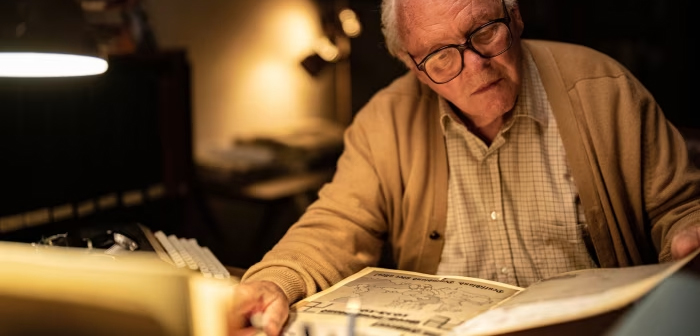You’d need a heart of stone not to be touched by this extraordinary true story of Nicholas Winton, the “British Schindler”, and by the simplicity and heartfelt directness with which it’s told by screenwriters Nick Drake and Lucinda Coxon and director James Hawes. It’s a story of wartime Europe and postwar memory, and also a noble and inspired moment in the history of British popular TV.
Anthony Hopkins plays Winton, a stockbroker in prosperous retirement in the 1980s who, after some nagging from his wife Grete (Lena Olin), is clearing out clutter and finally concentrates on something he’s been yearning and dreading to re-examine: a scrapbook with details of the 669 Czech Jewish children he and other humanitarians saved against incredible odds from the Nazis in the late 30s, without any historian knowing. This involved raising money, badgering government departments for visas, organising foster care; his own Kindertransport in fact. Johnny Flynn plays Winton as the young pro-refugee activist and Helena Bonham Carter packs a mighty thespian punch as Flynn’s formidable no-nonsense mother Babette, who runs his campaign from London.
The rescue mission involved nine trainloads of children, all of which have to pass through Nazi territory on their way to Britain. These are scenes of almost unbearable tension: at any moment, for any bureaucratic reason, or just for no reason at all, the Nazi soldiers suspiciously inspecting the children’s papers on board the train could turn them back. Eight trainloads get through reasonably well, due to their rescuers’ British national status in this prewar time – but the ninth is still on the platform at Prague when news of Germany’s invasion of Poland comes through. Swaggering Nazi soldiers swarm into the station and anguish and horror is imminent; this is the tragedy that colours Winton’s memories.
After the local press failed to get interested in this remarkable document, it caught the attention of Elisabeth Maxwell, wife of Robert; and from there it passed to Esther Rantzen (played here by Samantha Spiro), host of the legendary popular show That’s Life! Rantzen invites him to the show twice, in a This-Is-Your-Life-type surprise, and on the second occasion, secretly contrives for every single other member of the studio audience to be either one of these grownup child refugees or a descendant. It was a goofy, almost silly caper which could have gone wrong or turned out to be misjudged; instead it was a moment of secular grace, like something from a late Shakespeare play. The film does justice to this overwhelmingly moving event in British public life in a quietly affecting drama.

